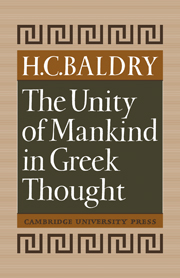Summary
ERATOSTHENES
The last few sections have attempted to show that in spite of changing ideas of human relationships after Alexander, and in spite of the implications of Stoic theory in particular, there was a wide gap between any conception of mankind in the third century b.c. and the view, primarily Stoic, which was widespread in the first. This later belief that not only the wise but all men, or at any rate all civilised men, are already fellow-citizens of the world city, is very different from anything that we find in Theophrastus, Epicurus, Zeno or even Chrysippus. When did this further development take place towards a wider, though also shallower, vision of humanity? And what were its causes?
It is an oversimplification to suppose that such a shift of thought can be given a date, and the reasons for it were, no doubt, many and various. But if one principal factor is to be singled out, it must be the impact of Rome, beginning in the third century and becoming the dominating feature of the situation in the second, and bringing to the Greeks a broader and more complex picture of the human race. In short, the idea of the unity of mankind in this broader sense was not Greek, but Graeco-Roman.
Information
- Type
- Chapter
- Information
- The Unity of Mankind in Greek Thought , pp. 167 - 203Publisher: Cambridge University PressPrint publication year: 1965
